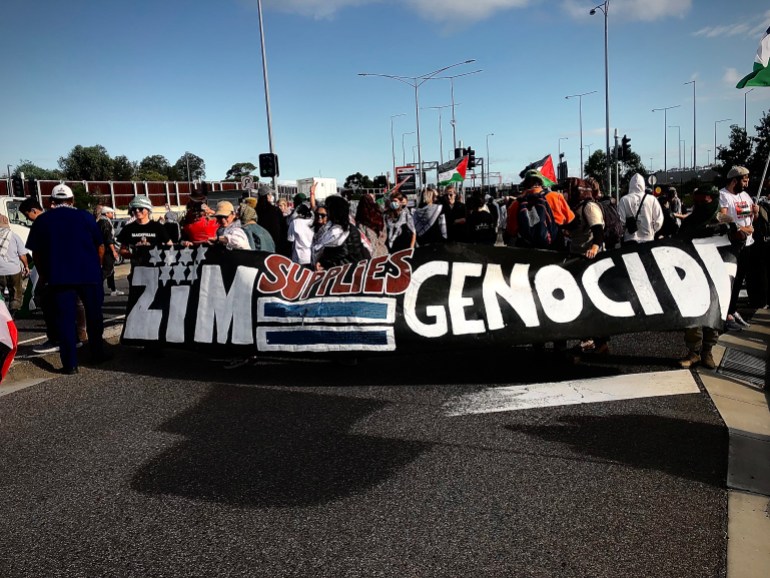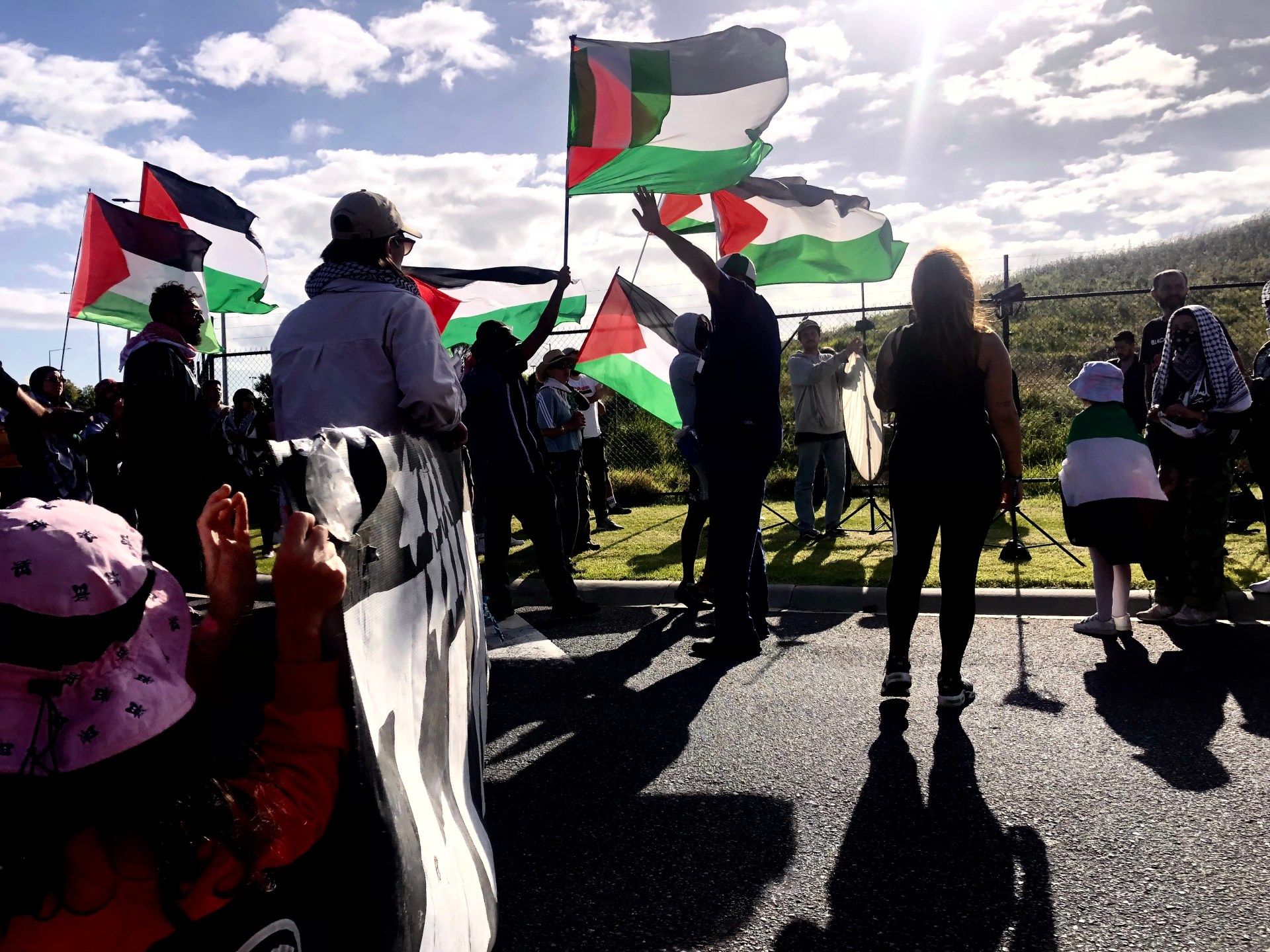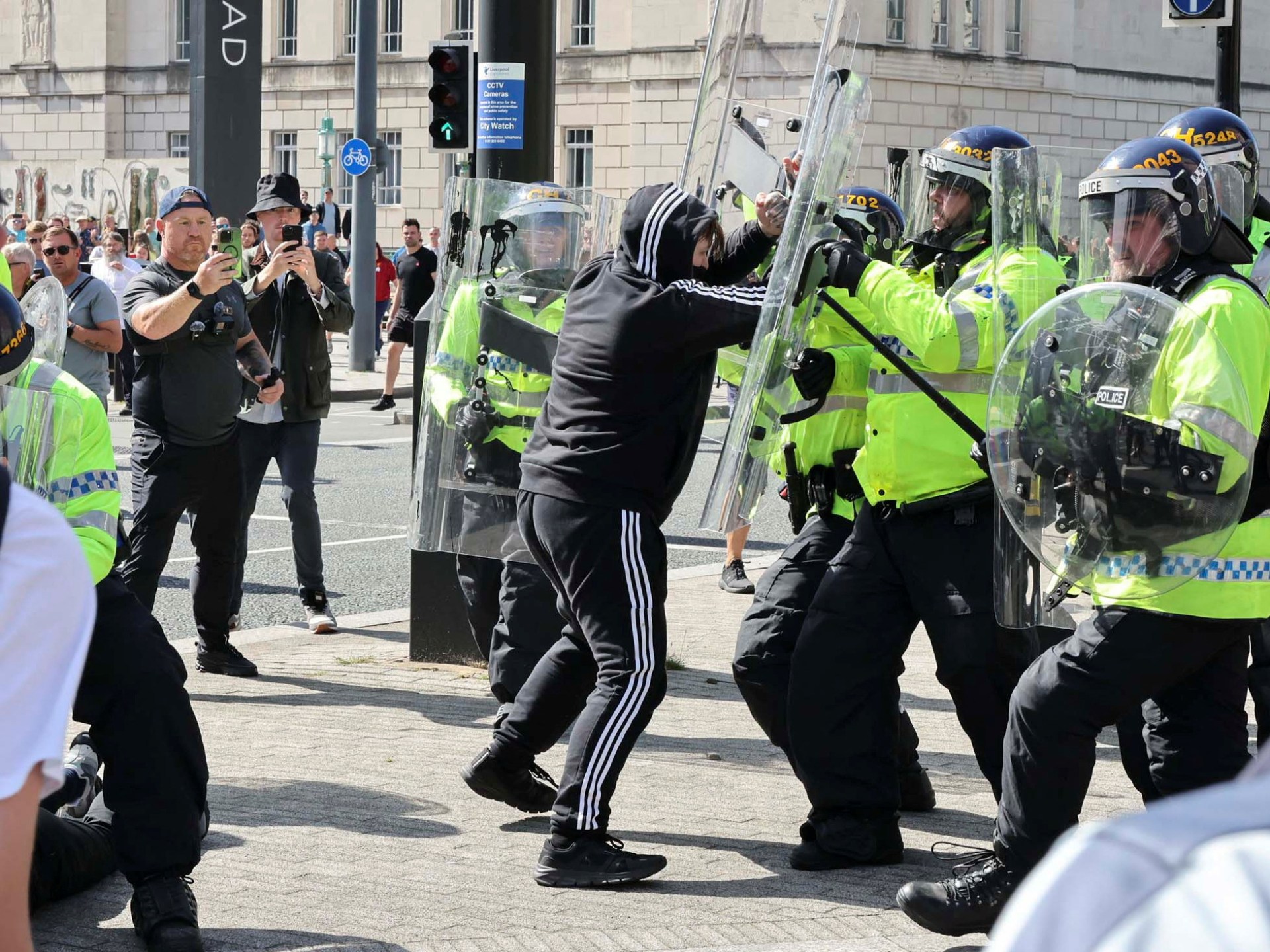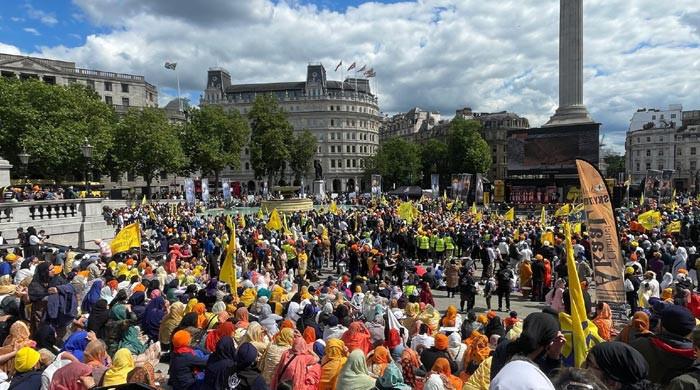Melbourne, Australia – Ports have become the center of pro-Palestinian demonstrations in Australia, as protesters attack Israeli ships and vessels alleged to have links to the country.
Last week, dozens of people tried to stop the container ship ZIM Ganges from reaching the port of Melbourne, with police eventually using pepper spray to break the blockade against a backdrop of containers and cranes, familiar symbols of a global industrialized world.
Dozens of people were arrested after the picket blocked access to the wharf and forced the Victoria International Container Terminal (VICT) to close. Volunteer legal observers (MALS) who accompanied the protesters say they were met by about 200 police officers, some of whom were on horseback.
Tasnim Mahmoud Sammak, from the Melbourne community organization Free Palestine, was at the blockade, which lasted four days.
“I have family in Gaza and they have nowhere to go in the bombed-out prison it has become,” he said.
Sofia Sabbagh, a prolific Palestinian artist based in Melbourne, was also present at the final showdown.
“They surrounded us, forming lines, intimidating us,” he told Al Jazeera, saying the group complied with a request to move forward to avoid arrest.
Legal observers say the crowd was not threatening and people were simply chanting.
“Once we were on public property, police took us away from our medical supplies and equipment, pulled one person out of a wheelchair, and pushed numerous other people, pepper spraying over 20 people,” Sabbagh added. “I was traumatized watching someone being dragged out of their wheelchair.”
Victoria Police said the use of pepper spray was in response to the “dynamic nature” of the blockade and the threat of “aggressive” protesters.
After a dozen arrests, the exhausted enclave of activists descended on Sandridge Beach. There, Declan Furber Gillick, a representative of the Black People's Union revolutionary group, gave an impassioned final speech calling for the continued disruption of the military-industrial complex through the use of “peaceful, people-driven revolutionary tactics” before the group dissolved. and went home.
The blockade was established at the port on the afternoon of January 19, just hours before the ZIM Ganges, sailing under the Portuguese flag, docked in Melbourne, Australia's second-largest city.
ZIM Shipping was founded in 1945 as part of Israel's quest for statehood, initially helping Holocaust survivors travel to the new State of Israel. ZIM, currently Israel's 10th largest shipping company, has sparked protests since CEO Eli Glickman promised to meet all of Israel's needs following Hamas's October 7 attacks on southern Israel and declaration of war. from Israel to Gaza.
Port Melbourne handles around 8,850 containers a day and is Australia's largest commercial port. The protests had “effectively halted operations” for nearly four days, VICT said in a news release after police ended the picket.
Tradition of radical action
The ragtag group of activists worked in shifts, preventing six consecutive shifts of dock workers from entering the terminal and forcing the ZIM Ganges to anchor in the bay until it was finally able to enter the port around midnight on January 21.
The blockade was originally organized by a group called Unionists for Palestine (U4P) but, as the days passed, it attracted wider interest. By January 20, it had become a broad coalition of Palestinians, First Nations and peace groups.
U4P member Fiona Healey said the picket was aimed at disrupting the company's supply chain as it continued to “support and supply an apartheid regime”.
This was reiterated by community organizer John Smith.
“We target the Port of Melbourne in solidarity with the Palestinians' call to dismantle all companies complicit in the ongoing genocide in Gaza, and that includes ZIM shipping,” Smith said.
Members of the Maritime Union of Australia (MUA), such as dockworkers, were advised not to cross the picket line for health and safety reasons.
Many port workers, who would have been escorted to the terminal by police, refused to cross the picket line. An online fundraiser raised more than 25,000 Australian dollars ($16,469) for the workers, who were initially not paid for the days they did not work, but the money was redirected to relief efforts in Gaza after the Union secured payment for dockworkers.
U4P's Ben Hjorth told Al Jazeera the movement was linked to a broader “anti-war” cause within the Australian union movement.

He referenced Nelson Mandela's 1990 speech in Melbourne, in which he thanked Australian workers for leading the global boycott of ships bound for apartheid South Africa. Hjorth cited those radical but successful industrial actions by the MUA as a source of inspiration, adding: “Sometimes you have to break the law to change it.”
VICT chief executive Bruno Porchietto told Australian media Channel 7 that the four-day picket had probably cost the port about “50,000 containers” and Victoria “millions of dollars”.
But state Treasurer Tim Pallas downplayed the financial impact of the blockade, saying the brief protest will only “minimally affect” the economy in the long term.
When the ZIM Ganges finally arrived at the dock, some protesters were following it online through the boatfinder.com tracking site. They say the ship disabled its GPS tracking when it arrived at port, noting that the two tugboats accompanying it did not do so, leaving a gap where the ZIM Ganges was.
“This is very unusual behavior,” said U4P's Hjorth.
Under Australian maritime law, ships can only disable their GPS tracking for safety reasons.
Since the protests, other ships have been able to dock in Melbourne without interruption.
But the threat of action remains.
Hjorth said the group aims to disrupt Israeli supply chains until there is a “permanent ceasefire in Gaza and the end of the occupation.”
On Monday, the ZIM Ganges was due to arrive in Sydney, where protesters staged a demonstration last November against another ZIM ship. The shipping line's schedule shows it will also travel further up the east coast to Brisbane.












